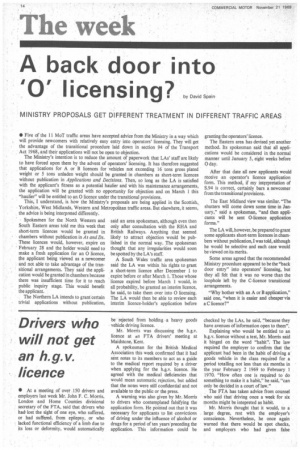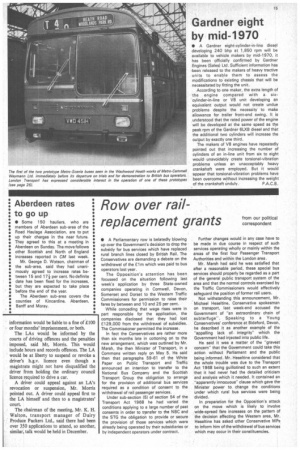Drivers who will not get an h.g.v.
Page 16

Page 17

If you've noticed an error in this article please click here to report it so we can fix it.
licence
• At a meeting of over 150 drivers and employers last week Mr. John F. C. Morris, London and Home Counties divisional secretary of the FTA, said that drivers who had lost the sight of one eye, who suffered, or had suffered, from epilepsy, or who lacked functional efficiency of a limb due to its loss or deformity, would automatically be rejected from holding a heavy goods vehicle driving licence.
Mr. Morris was discussing the h.g.v. licence at an FTA drivers' meeting at Maidstone, Kent.
A spokesman for the British Medical Association this week confirmed that it had sent notes to its members to act as a guide to the medical report required by a driver when applying for the h.g.v. licence. He agreed with the medical deficiencies that would mean automatic rejection, but added that the notes were still confidential and not available to the public or the press.
A warning was also given by Mr. Morris to drivers who contemplated falsifying the application form. He pointed out that it was necessary for applicants to list convictions of driving under the influence of alcohol or drugs for a period of ten years preceding the application. This information could be checked by the LAS, he said, "because they have avenues of information open to them".
Explaining who would be entitled to an h.g.v. licence without a test, Mr. Morris said it hinged on the word "habit". The law required the employer to confirm that the applicant had been in the habit of driving a goods vehicle in the class required for a period totalling not less than six months in the year February 2 1969 to February 1 1970. "How often one is required to do something to make it a habit," he said, "can only be decided in a court of law."
The FTA has taken advice from counsel who said that driving once a week for six months might be intepreted as habit.
Mr. Morris thought that it would, to a large degree, rest with the employer's conscience. Nevertheless, he once again warned that there would be spot checks, and employers who had given false information would be liable to a fine of £.100 or four months' imprisonment, or both.
The LAs would be informed by the courts of driving offences and the penalties imposed, said Mr. Morris. This would include hours and records offences. The LA would be at liberty to suspend or revoke a driver's h.g.v. licence even though a magistrate might not have disqualified the driver from holding the ordinary council licence required to drive a car.
A driver could appeal against an LA's revocation or suspension, Mr. Morris pointed out. A driver could appeal first to the LA himself and then to a magistrates' court.
The chairman of the meeting, Mr. K. H. Walton, transport manager of Dairy Produce Packers Ltd., said there had been over 350 applications to attend, so another. similar, talk would be held in December.




































































































